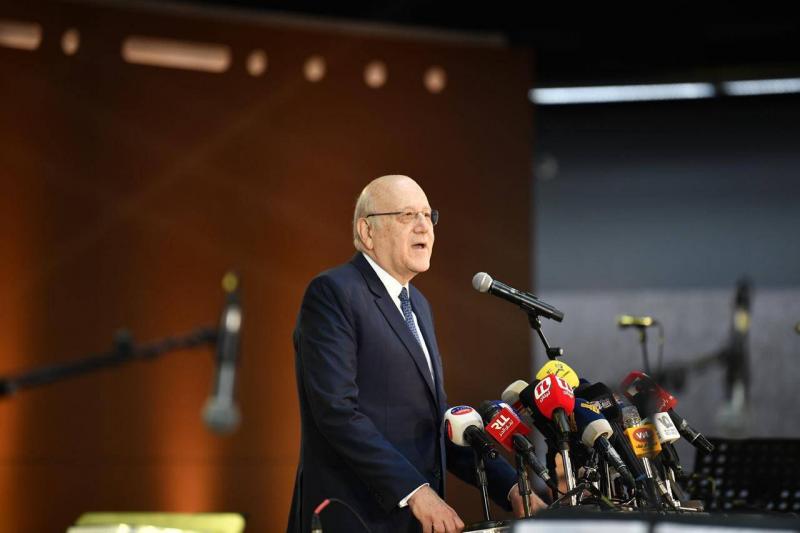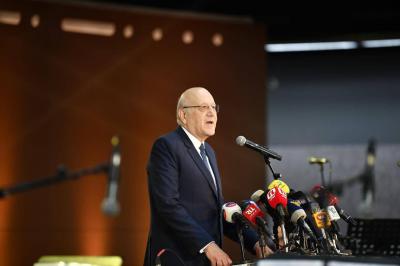Interim Prime Minister Najib Mikati affirmed today, during the launch of the events for Tripoli as the Capital of Arab Culture 2024, that "today we witness a vibrant history that Tripoli has carried and protected generation after generation." Mikati questioned, "Why do some insist on placing obstacles in front of the government? Why don’t we eliminate the state of disruption so that constitutional institutions can perform their duties, starting with the election of a president for the republic?"
He added, "Tripoli, ladies and gentlemen, is a city like no other; it is the mosque and the church, the school and the takiya, the library and the university, the hospital and the market of the poor, the khans and crafts, the castle and the exhibition, the river and the sea, the islands and the hills, the alleys and the streets, the Mamluk neighborhoods and the modern districts; it is also the city and all its surroundings, from the highest peaks to the lowest salinity, from the furthest shores to the nearest ports. But most importantly, its human fabric, which intertwines all elements of national unity. It is a city that attracts its residents and those around it, and even those further away, integrating them into a single identity, to achieve and embody the meaning of Lebanon as a message."
He continued, "In the mid-20th century, Tripoli emerged from its riverine community into the world of modernity. This emergence was accompanied by a cultural movement that had a profound impact on the structure of the city and the formation of its people, due to significant openness to other cultures. Tripolitans embraced all modernity's offerings within an environment of intellectual tolerance, vast vision, and available resources. As a result, Tripoli became a leader in renewing the elements of its heritage. Yet it remained, at the same time, true to its identity, as its people upheld their Arabness, committing themselves, even to the point of martyrdom, to the Arab causes, foremost among them the Palestinian issue, up to the genocidal war that Israel is currently waging against Gaza and its inhabitants, and the ongoing assaults on southern Lebanon, which the enemy seeks to turn into a scorched and devastated, uninhabited area—something it will certainly not achieve."
He pointed out, "Perhaps the most significant hallmark of Tripoli entering a new phase is the exhibition we are currently in, named after the martyr president Rashid Karami. It is true that the ideal benefit from it, based on its location, design, and function, has not yet been realized, but there is reason for joy in Lebanon that it was recently added to UNESCO's World Heritage list, which undoubtedly places a great responsibility on us to preserve both the heritage carrying the name of this exhibition and this unique architectural landmark, using it within the established technical and legal frameworks to fulfill the national function for which it was built."
Mikati remarked, "If we apply the principle of renewing history in public policy in Lebanon, the same crises would not be repeated in our national life. The state of disruption we are experiencing today is merely a recurring history; we have gone through it before and are experiencing it again today. Some politicians among us do not learn from past mistakes, but rather repeat them, causing significant damage to the nation and its citizens amid delicate and dangerous circumstances, both concerning the living conditions stemming from the financial and economic situation, the security situation resulting from the repercussions of the Gaza war and the ongoing Israeli aggression from the south, and the burdens imposed by the issue of Syrian displacement on every village, town, and neighborhood in Lebanon. So why do some insist on reverting to the past instead of renewing it? And why don’t we take the initiative to eliminate the state of disruption so that constitutional institutions can perform their role, starting with the election of a new president, leading to the activation of the last government agency of the state?"
He asked, "The most important question is why the insistence on negativity, destruction, and placing obstacles in front of a government that strives to preserve the entity of the state and its institutions while waiting for a complete contract of institutions? From Tripoli specifically, I reiterate and confirm that there is no room for despair in our hearts, and we are determined to work with determination and will to overcome this difficult phase in Lebanon's history and alleviate the pain of the Lebanese people as much as possible, setting things on the track to recovery."
Mikati concluded, "Before ending, I want to commend what Culture Minister Judge Mohamed Wissam Al-Murtada has done by moving his residence from Beirut to Tripoli to follow up on all the activities and procedures related to this event, and who has spared no effort to ensure its success. I also commend the enthusiasm of the cultural institutions in the city and its surroundings to achieve the same goal, serving Tripoli and Lebanon."
He ended by stating, "Tripoli celebrates today with joy its crowning as the Capital of Arab Culture, despite the harsh conditions surrounding it and the nation. Congratulations to it and to Lebanon and the Arabs. Long live culture, long live Arabism, long live Tripoli, and long live Lebanon."
The Minister of Culture, for his part, indicated that "this occasion should be an opportunity for Tripoli to regain its full path on the road map for sustainability, and we must embrace it to declare its luminous reality."
The main celebration for the declaration of "Tripoli as the Capital of Arab Culture for 2024" took place in the conference hall at the Rashid Karami International Exhibition in Tripoli, under the invitation of Al-Murtada and the patronage of President Mikati.




